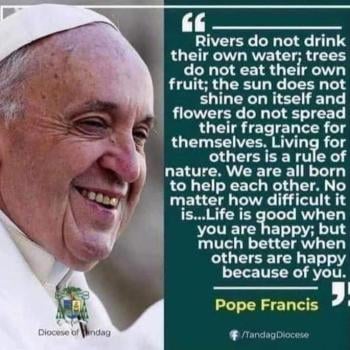Still, sometimes those feelings come back. When I see pastors playing games, or when people call to tell me about their frustrations with the church and the ways in which the church has wronged them, those feelings return. Some people run their churches like Fortune 500 companies, and the politics get nasty. It breaks my heart. That's not what the church is supposed to be.
But for the most part, I've dealt with that bitterness and healed by knowing that I need grace just as much as everyone else does. And my experiences have put me in a position to minister to others who are disenchanted with the church.
A lot of pastors' kids who go through a prodigal son experience in the way you have wrestle with a sense of unworthiness, or even self-hatred. Has that been a struggle for you?
I've wrestled a great deal with self-hatred and feeling unworthy. But it didn't have so much to do with my parents as it did with sermons I had heard preached or the way the church treats people. I also felt a lot of insecurities growing up. It seemed that I could never quite add up to what was expected of me.
I think almost everyone goes through this, not just preachers' kids or people raised in the church. A lot of people have to deal with negative attitudes toward themselves because of unrealistic expectations that are placed on them.
Your mother became an unlikely icon for the gay community, and you've been outspoken in your view that the church is wrong not only in condemning homosexuality but also in mistreating homosexuals. Have you been surprised by the response you've gotten for these views?
No. I've gotten a lot of negative responses, and some really great positive ones, but it's more or less what I expected. I would say that the church doesn't seem quite ready, except one cannot speak about "the church" in such a blanket statement. Some people are ready to be affirming, but many of the loudest are not ready.
I lost some speaking engagements when I announced that I was an affirming pastor, and I had to let some of my staff go when a supporter withdrew. But nothing much surprises me anymore.
Do you think this will still be an issue ten years from now?
It will still be an issue, yes, but there will be more of a balance between those who are affirming and willing to admit that we've made mistakes as the church, and those who are still digging their heels in. But, who really knows? I meet countless people who are very open theologically, who have great churches and do great work, but for some reason they can't get past the gay issue.
You've seen the evangelical church in America change a great deal in recent decades. Your own story is intertwined with the story of that change. Where do you think the evangelical church will be twenty years from now?
I think the evangelical church has an opportunity to do some great things and make a great difference in the world. But the evangelical church is held back by its hang-ups: theological disagreements, fighting the Emergent church, fighting over new ideas. We need to be a community where we can agree to disagree and still be a community and discuss these things charitably.
If things continue to go the way they are, however, in twenty years the evangelical church will have continued to lose influence. Some want to appear tolerant and inclusive while still condemning gays, but people see through that. No matter how good our intentions are, at the end of the day people want to know whether we love and accept them. We need to humble ourselves and realize that we are not the ones who do the changing. Our job is to love people and allow grace—not us—to change their lives. Otherwise the evangelical church will continue to become more and more irrelevant every day.
That's sad. I saw what a force for good my parents had when the evangelical church was at the height of its influence. But now there is so much infighting, even amongst progressives. Can it last? I don't know. As Jesus said, a house divided against itself cannot stand.
By no means do I see myself as a part of the solution. I might be a part of the problem. It's hard to know when to speak and when to hold your tongue, or when to take a stand and when to keep your peace. Does it help when someone like Scot McKnight writes what he wrote about Brian McLaren? Or does it create an us-versus-them environment? Or does it help when I write critically about Mark Driscoll? We believe very different things. How do we allow the truth of those differences to be out there in the open, without falling into warring camps? In the midst of our differences, we must become more of a church, more of a body. How do we do that?





